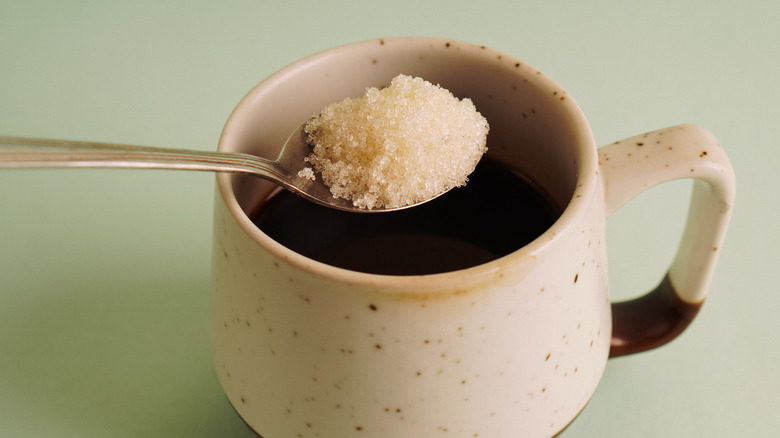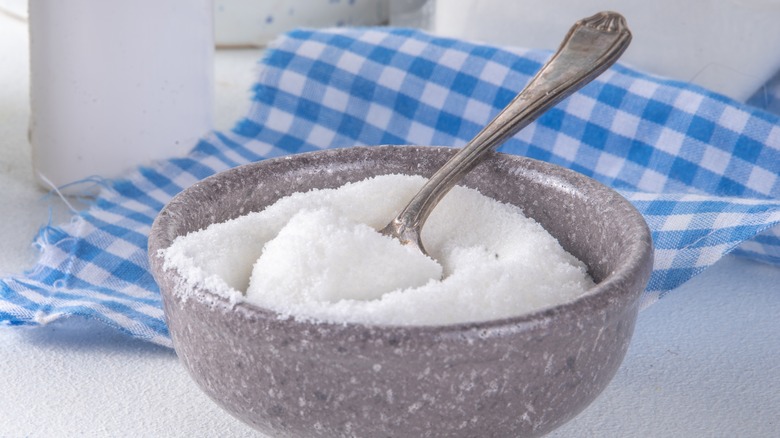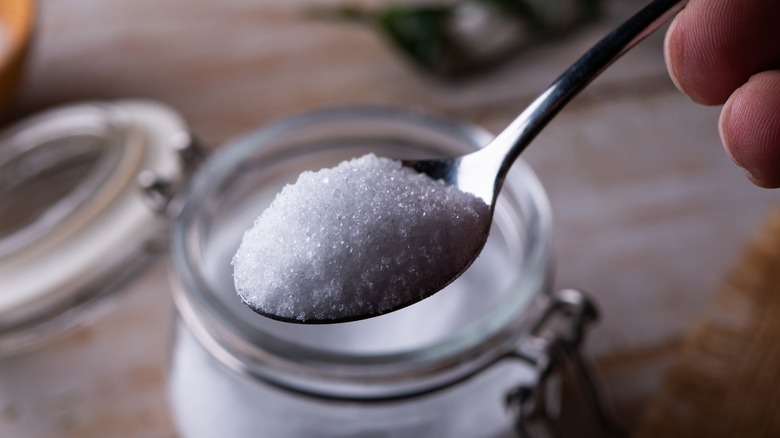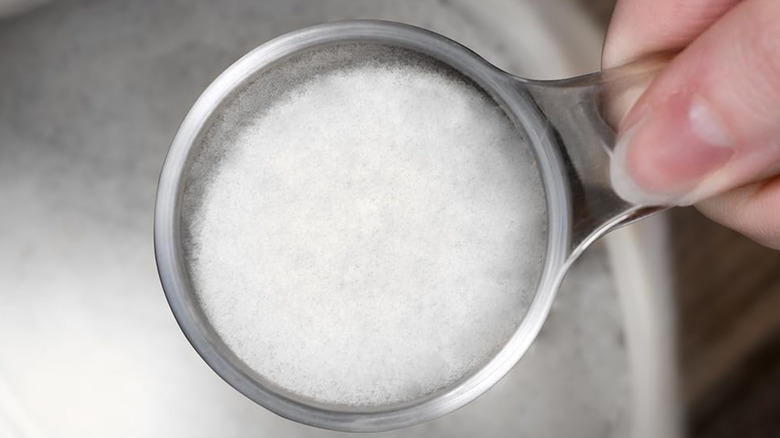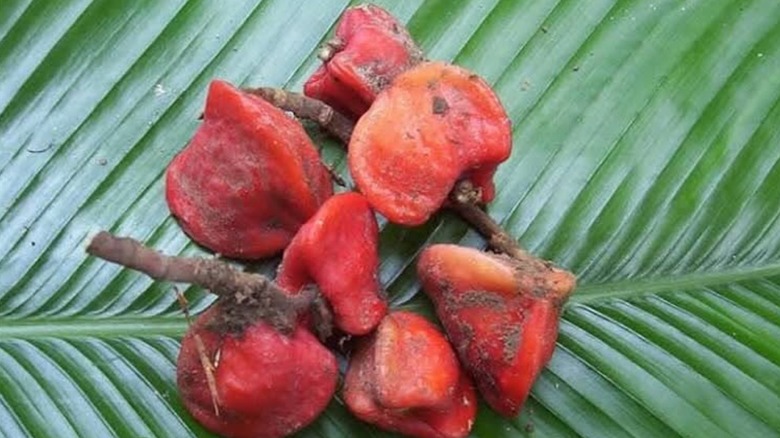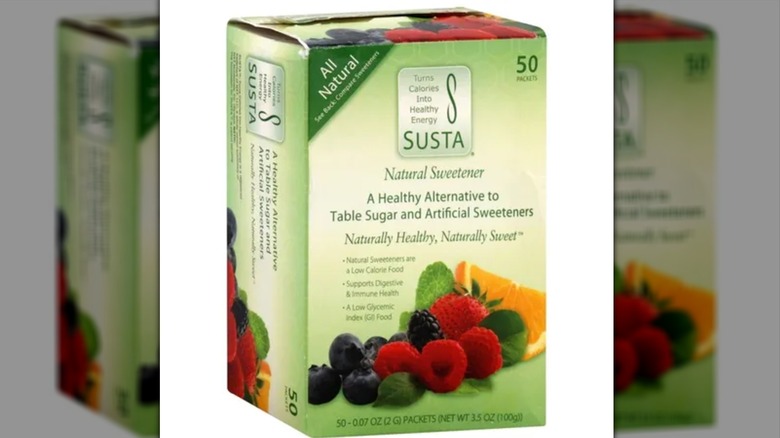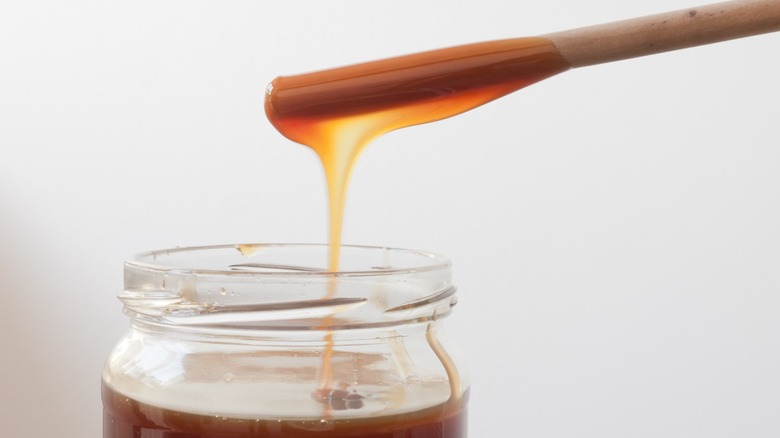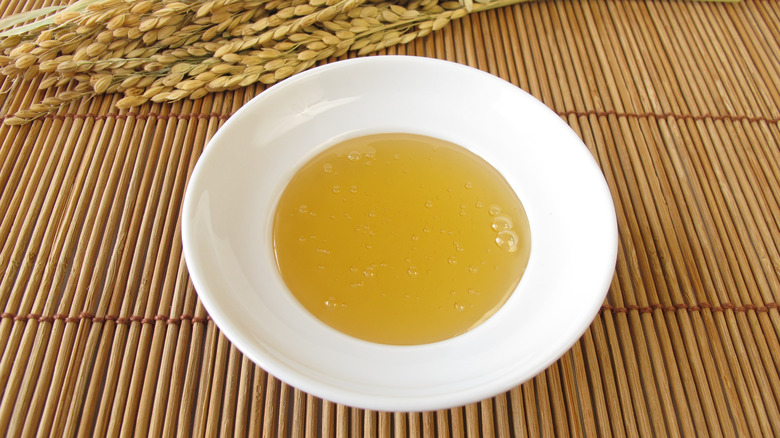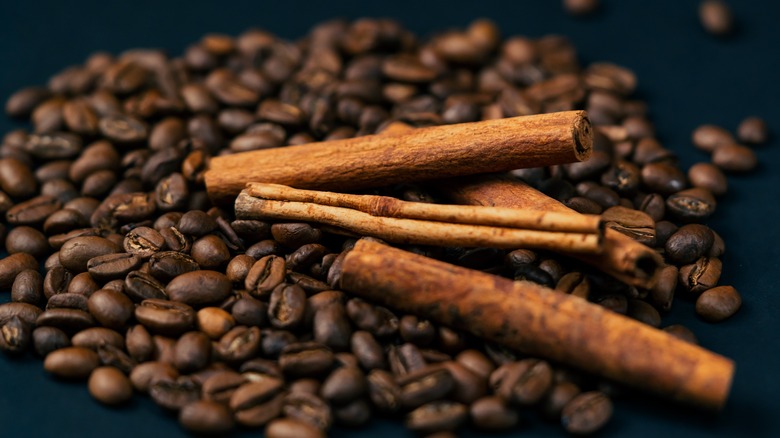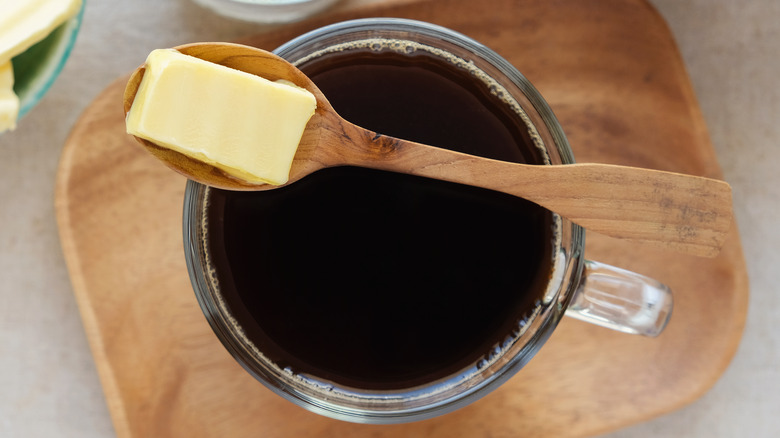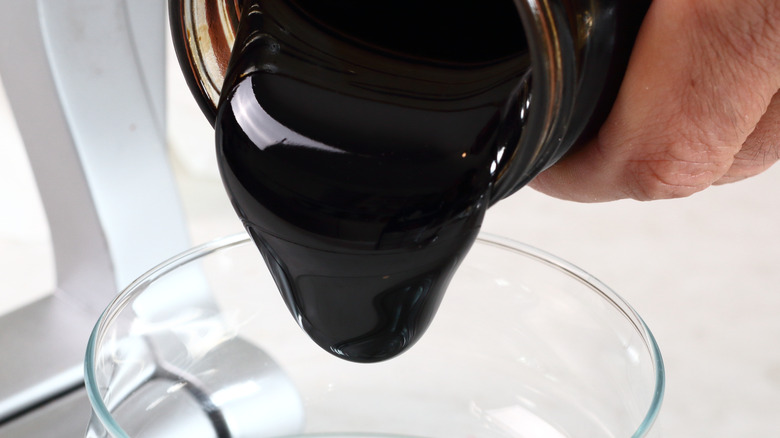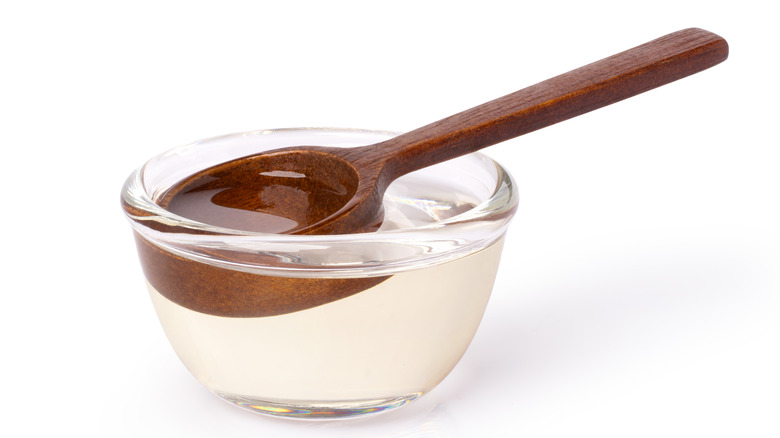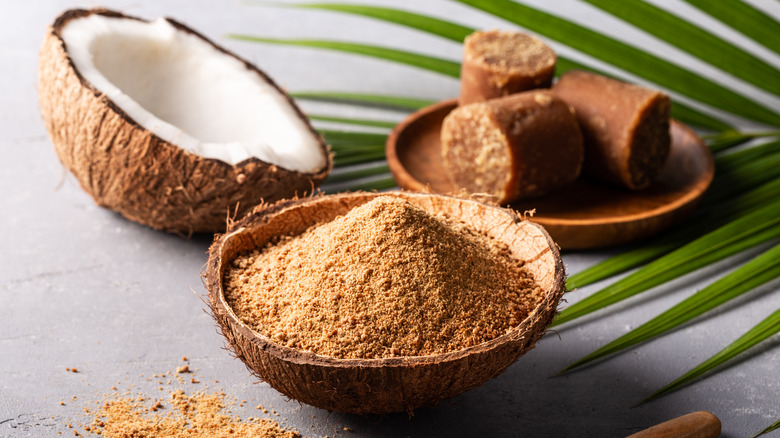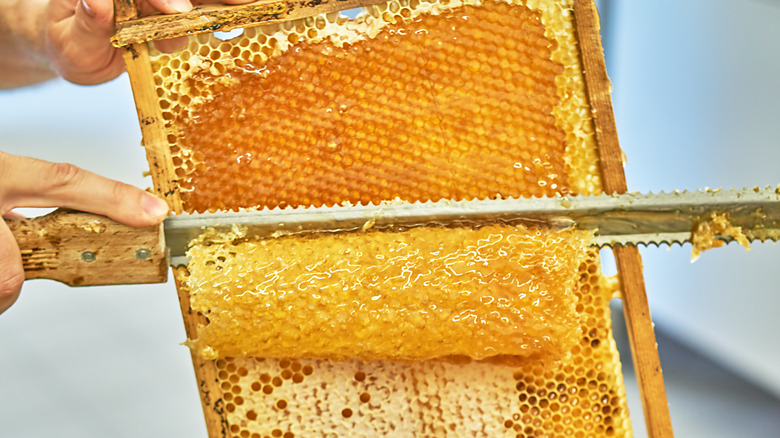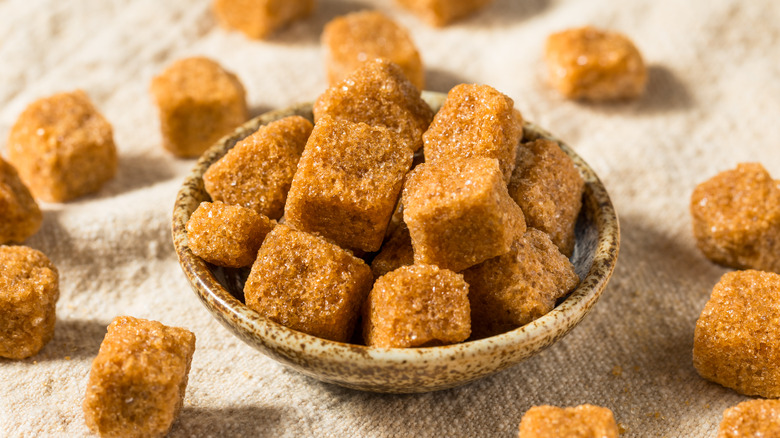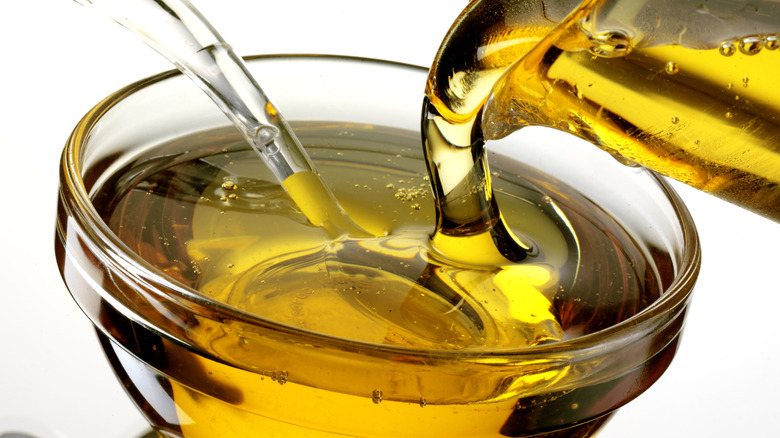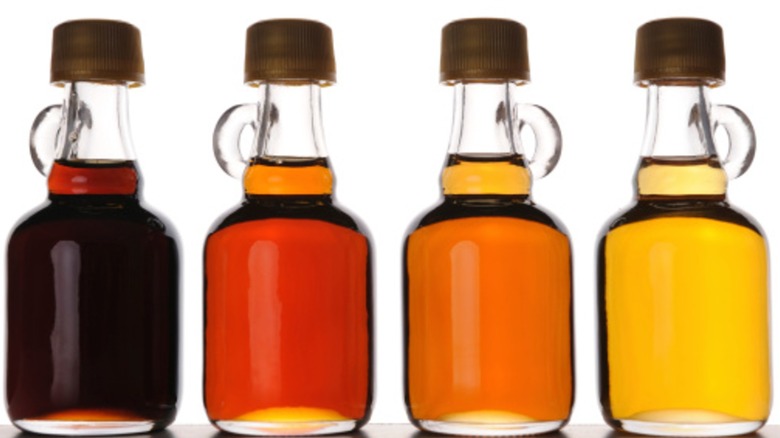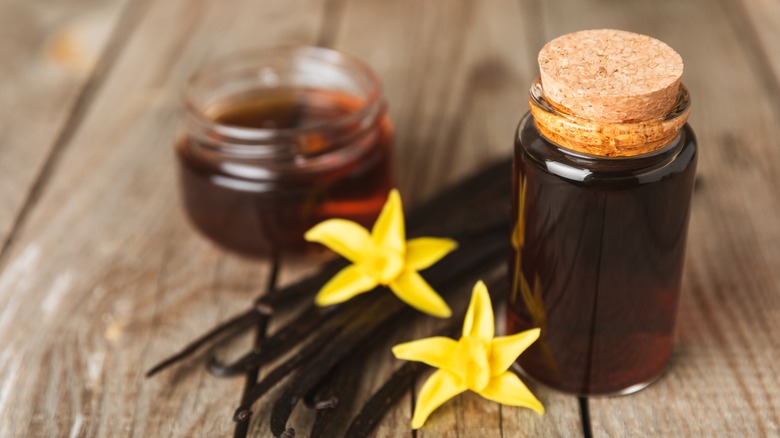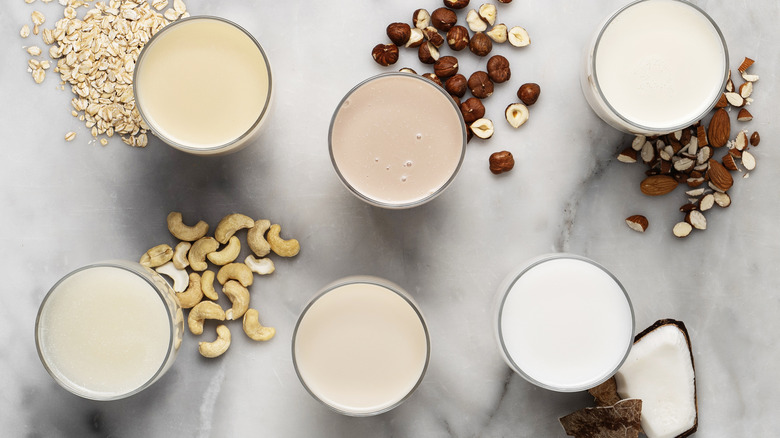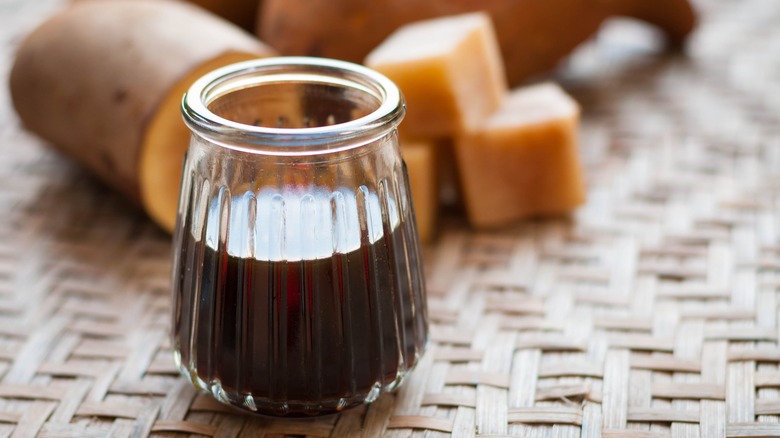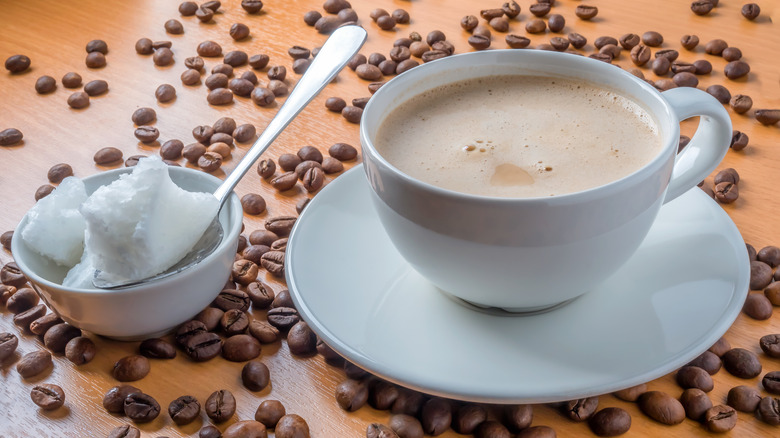The 23 Best Sugar Substitutes To Use In Your Coffee
We may receive a commission on purchases made from links.
Millions of us enjoy a cup of coffee in the morning. It helps us wake up and get going — just like the Ethiopian abbott (according to legend) who is credited with creating the drink in the 9th century. Fast forward to 16th century coffee brewers in the Middle East, who started adding sugar to their favorite beverage, as did Franz George Kolschitzky, who opened the first-ever coffee house in Vienna, where it was served with milk, cream, and sugar.
Sugar helped to make cheaper coffee taste better but it also tapped into a deep-rooted love of sweets. Scientists know sugary foods were a source of nutrition for our ancient forebears, but the refined sugar we find everywhere today is a health hazard. What's a coffee lover to do? Well, you could try the many alternatives. Here are 23 of the best sugar substitutes to use in your coffee.
Allulose
Johns Hopkins Medicine describes allulose, stevia, tagatose, and monk fruit as "plant-derived non caloric sweeteners" or novel sweeteners. Although in powdered form they look and taste just like regular sugar, novel sweeteners have a few more benefits up their sleeves. Allulose has a glycemic index of zero, which means it does not raise blood sugar levels, and could even lower them.
It also contains 10% of the calories found in traditional sugar, so adding allulose sweetener to coffee could help people lose weight as part of a balanced diet. Too much can lead to digestive disruption, so researchers recommend a maximum daily intake of 0.9 grams per kilogram of body weight.
Erythritol
Scientists have used sugar itself to create a range of artificial sweeteners that includes isomalt, sorbitol, xylitol, and erythritol. More often found in processed foods like chewing gum and candies, some of them can also be used as a sugar substitute. Erythritol is one, and it is the key ingredient in popular brands such as Swerve sweetener.
The advantages of erythritol are it is just as sweet as traditional sugar but, unlike many artificial products, it doesn't have a strange, bitter aftertaste. It also dissolves nicely in coffee. Like allulose, consuming too much erythritol can lead to digestive issues, so if you're making the switch from cane sugar, start with a little at a time.
Trehalose
It might sound like sci-fi, but sweet-toothed people across Asia and Japan will be very familiar with trehalose. Found naturally in honey, fungi, and bacteria, trehalose is a disaccharide (which means it's a combination of two single sugar molecules), and the powdered form is extracted from tapioca starch.
Although it's not as sweet as cane sugar, it is an ideal substitute for the white stuff, and not just in your everyday cup of morning joe. Home cooks can use trehalose powder in exactly the same way as cane sugar. It's great for making super-smooth ice cream, it helps keep baked goods drier for longer, and it can tolerate both heat and acid. Trehalose is also a great stabilizer, perfect for mousses and meringues.
Thaumatin
We have the katemfe fruit of West Africa to thank for this natural sweetener. Thaumatin comes from the sac that surrounds the katemfe fruit's black seeds. Regarded as a protein rather than a carbohydrate, it has minimal impact on blood sugar. It's great for adding to coffee but be warned: A little goes a long way.
Thaumatin or katemfe fruit extract can be up to 3,000 times sweeter than traditional sugar, and can taste a little like licorice. It's stable and dissolves in water – hello morning coffee sweetener — but don't use thaumatin for preserving, as it becomes unstable in acidic conditions. It can also prompt adverse reactions among people with food allergies.
Susta
Many people take pre and probiotics, thanks to the boost they give the body's good bacteria. But imagine if they were combined in a product that could help support our sweet tooth? In 2009, Massachusetts firm NXT Nutritionals did just that. They unveiled Susta, a natural product that contains pro- and prebiotics, as well as minerals, and vitamins.
Susta has more fiber than traditional sugar or sweeteners, and its flavor comes from "a proprietary all-natural extract from citrus" that boosts the tiny amount of fructose in the product, according to Richard Kozlenko, director of research and development at NXT Nutritionals. Susta is more than twice as sweet as cane sugar but has a low glycaemic index and, at just 5 calories per pack, could help to keep waistlines trim.
Barley malt syrup
Some brewers might consider using barley to make malt syrup rather than beer — however, as a sugar substitute for coffee, it ticks all the right boxes. You can make it at home, but if you don't know your protease from your chitting, the internet is on hand to provide ready-made jars of barley malt syrup.
It can be used in the same way as molasses, from adding to recipes for baked goods to spooning straight into a cup of hot coffee. Unsurprisingly, it has a robust, malty flavor, but it's not as sweet as sugar, so you may need to use more than you think. Luckily, barley malt syrup has a relatively low glycemic index of around 42, so an extra spoonful is not going to send your blood sugar soaring.
Brown rice syrup
Similarly to malt syrup, you can make a brown rice version at home by mixing enzymes with cooked rice to create a thick, sweet syrup. Although it's made from a healthy food, the sugary liquid doesn't have the same nutritional profile. Essentially brown rice syrup is 100% glucose, which can be broken down by every cell in the body. However, it also has a very high glycemic index of 98, so it will impact blood sugar levels.
Healthline says, "Significant amounts of arsenic have been found in rice syrups," adding the FDA regarded them as not high enough to be dangerous. Used sparingly, brown rice syrup is a sweeter alternative to barley malt, and will make you savor your coffee like a good wine. If you want to cook with brown rice syrup, try a dash in home-made caramels or baked goods.
Lucuma powder
Table sugar is a good source of carbs and not much else, but the same cannot be said of lucuma powder. It comes from South America's Pouteria lucuma tree, whose fruit is known as the "gold of the Incas." It is full of dietary fiber, as well as carotenoids and polyphenols: Antioxidants that can help prevent diseases such as diabetes and cancer.
Lucuma powder also contains minerals such as potassium and vitamin B3, though it packs a carbohydrate punch too, with 35 grams in every 40-gram serving. It is finer and more tawny-colored than cane sugar and you can use it the same way, but it tastes more like the brown variety. For baking, you need 1 cup of lucuma powder for every½ cup of brown sugar.
Cinnamon
If you thought cinnamon was only good for rolls — also, have you tried cooking canned cinnamon rolls this way? – you'd be wrong. Health experts recommend it as a perfect addition to a cup of coffee, and not just for taking off that bitter edge. A daily teaspoon of powdered cinnamon contains antioxidants, nutrients, and vitamins that will add a wellness boost to your morning joe.
If cinnamon doesn't hit the spot for you, it's worth trying other warm spices that you may have only used before in baking, such as nutmeg, cloves, ginger, or even cardamom. Each one can enhance your coffee's flavor and give it a hint of sweetness without ramping up blood sugar levels.
Grass-fed butter
Anyone who is a keto or low-carb diet devotee is probably already dosing their daily coffee with butter. If you're new to the concept of Bulletproof Coffee, here's the skinny: It's a whisked-up blend of good quality coffee beans, unsalted, grass-fed butter, and a medium chain triglyceride — usually palm kernel oil, butter, or coconut oil.
While Bulletproof Coffee offers a low-carb way to start the day, adding butter to an ordinary cup of joe is another way to sweeten it without resorting to sugar. Opting for grass-fed butter from your local Costco, or even the clarified version, ghee, means you're more likely to get a better quality drink. Not only will it be reflected in your coffee's taste, but for every recipe in which you use butter.
Blackstrap molasses
There is molasses and — after a third boiling to create a thick, concentrated liquid — there is blackstrap molasses. With a moderate glycemic index of 55 and hefty, bittersweet flavor, it's packed with calcium, iron, and vitamin B6. Some sources suggest it could help with combating stress.
Despite its various benefits, blackstrap molasses will impact your blood sugar, thanks to the 14 grams of carbohydrates found in a single tablespoon. Home bakers should be aware that it's not always a straight replacement for ordinary molasses, but the blackstrap variety is a good alternative for brown sugar and an ideal way to sweeten your morning coffee.
Simple syrup
One way to reduce the amount of sugar you have in your coffee but still get the same sweet kick is to make a simple syrup. As the name suggests, it's easy to do: Just mix equal amounts of sugar and either hot or cold water in a saucepan and, over a low heat, stir until the sugar has completely dissolved.
You can add a splash to your coffee in the morning, and simple syrup is also a key ingredient in many cocktails and mocktails. If you want to have some fun, incorporate different flavors to your syrup: Add a few drops of fruit extract or just a pinch of spices, like cardamom, to create something totally unique and delicious.
Coconut sugar
Not to be confused with palm or arenga pinnata sugar (which is made from the sap of the date palm or sugar palm tree), coconut sugar is the dried, liquid nectar from flowers cut specifically from the coconut palm. It looks like brown sugar, has a butterscotch flavor, and contains calcium, iron, and zinc, as well as a prebiotic fiber known as inulin.
While coconut sugar has a lot going for it, when it comes to carbs and calories, it's almost exactly the same as table sugar. That means you can happily add it to your coffee, or cook and bake with it — keep in mind it will impact your blood sugar levels.
Raw honey
Millions of people opt for a spoonful of honey in their coffee or tea, seeing it as a healthier alternative to processed products. While that's largely true, raw honey has even more benefits. Some experts have suggested the process of pasteurizing honey to get rid of impurities can also eliminate important elements present in raw honey that are good for us, such as bee pollen and antioxidants.
Although there is a wide range of honeys available, some processed versions can contain additives — including rice syrup and high fructose corn syrup. To get the maximum benefits, raw honey is the way to go. Yes, you can spoon it straight into your coffee but it's also great on breakfast cereals, in baked goods and marinades.
Brown sugar
Some people think brown sugar is healthier than its white counterpart but it's a myth. Whether you use white or brown sugar in your coffee, they both have roughly the same number of calories and a high glycemic index in the mid 60s, so they will impact blood sugar levels.
The thing that separates brown sugar, muscovado, sucanat, and raw sugar from white is they all contain molasses, which gives this variety of powdered sugars their distinctive golden colors. You can use it as a direct swap for table sugar in everything from desserts and baking to hot drinks and sauces.
Unsweetened cacao / cocoa powder
Like other warm spices, unsweetened cacao powder is a delicious substitute for sugar in your coffee. You can choose from natural, raw cacao powder, or Dutch-process cocoa powder, made from beans put through a potassium carbonate wash to neutralize their acidity, leading to a mellow, easily dissolvable powder.
Both are more conventional ways of making bitter-tasting coffee more drinkable. As well as giving the flavor profile a chocolatey hint, you get all the antioxidant benefits of unsweetened cacao in a single cup. Be aware that if you go for a sweetened option, it won't taste quite the same and your blood sugar will be affected.
Agave syrup
Extracted from the salmiana and blue agave plants, agave syrup is a good substitute for sugar in coffee, and is easily dissolved. Because it contains 80% fructose and 20% glucose it also has less of an impact on blood sugar levels, even though it's sweeter than table sugar.
That said, eating too much fructose, which is mainly metabolized by the liver, can lead to other serious health issues, including type 2 diabetes and heart disease. Agave syrup is seen as an added sugar, because it increases the calorie count of foods and drinks, and brings little or no nutrients to the table.
Maple syrup
If you love coffee with a twist of nutty caramel, then maple syrup will be a great alternative sweetener for your coffee. Unlike table sugar, it comes in a range of flavors, from paler syrups with milder tastes to darker, more robust options. As well as bringing a slug of character to your coffee, there are a few health benefits to be gained by adding this kitchen staple.
Maple syrup is a source of antioxidants, and contains manganese and zinc, which are respectively great for the immune system and metabolism. Like traditional sugar, maple syrup is best stored in a cool, dark space — once opened, it will last for months in the fridge and even longer in the freezer.
Vanilla extract
Vanilla and coffee are a flavor match made in heaven (hello vanilla latte) — but even if you take your coffee black, a couple of drops will lift that morning joe to new heights. You can make your own vanilla extract by soaking the long, thin pods in vodka, buy it ready-made, or even infuse a simple syrup with the pods for endless drink options.
As well as bringing sweetness to your coffee, vanilla extract also contains the powerful antioxidant vanillin. It has potential anti-inflammatory and anti-cancer properties, and could boost brain health. Even better, vanillin's calming effect can offset any caffeine-related shakes.
Plant and nut-based milks
Plant and nut-based milks have been around for millennia but their acceptance as alternatives to cow's milk happened much more recently. The range is vast, from almond, soy, and oat milk ... to cashew, coconut, and unsweetened hemp milk. And they can all be used as a sugar substitute in your coffee.
Many of the nut-based milks have a slightly sweeter flavor profile, so a dash of almond or cashew nut milk will help soften the bitterness of your coffee. Many have a rich or creamy mouthfeel, elevating the average cup of joe into something truly delicious. It's worth testing a few to find the right pairings: Soy and cashew milk may split or curdle if poured into very hot drinks.
Yacon syrup
If you've never heard of yacon root syrup, now is the ideal time to buy some. This sweet potato-like vegetable doesn't look like much but it's actually very cool. Eaten raw, it tastes as refreshing as watermelon, and when its juice is cooked down, it creates a thick, sweet syrup.
As well as aiding digestion, thanks to one of its tongue-twisting prebiotics called fructooligosaccharides, yacon syrup is packed with vitamin C, potassium, and calcium, and can help reduce cholesterol. It is also one of the few coffee sweeteners that can lower blood sugar. It's ideal for spooning into coffee for a health-boosting twist, and is a great replacement for sugar in baking.
Coconut oil
Coconut oil is one of the medium length triglyceride fats used in Bulletproof Coffee, but it's just as good a substitute for sugar on its own. It provides a sustained energy boost to kick-start the body's metabolism, while for those following the keto diet, it can also help the liver produce ketone enzymes. It's also packed with antioxidants.
You don't have to restrict carbs to enjoy the benefits of using coconut oil in your coffee. As well as reducing sugar intake, it enhances the flavor profile of your morning joe, giving it an exotic taste. If you're trying it for the first time, start with a small amount as it can make you gain weight – add a dash of vanilla if you need more sweetness.
Date sugar / syrup
Dates offer two ways to sweeten coffee without sugar: A powder and a syrup. The first is made from dehydrated fruits that have been pulverised, the second is the liquid that comes from pressed, whole dried dates. Date sugar has a caramel-type flavor, while its crystals, which are not as regular-shaped as traditional sugar, don't completely dissolve in liquid.
Date syrup, on the other hand, is thick, rich, and sweet: Think maple syrup meets honey. Both date syrup and date sugar are calorific, so they're not ideal for anyone with diabetes, and have little nutrition. That said, they do taste amazing in coffee, and can be used as straight replacements for brown sugar, honey, or molasses.
